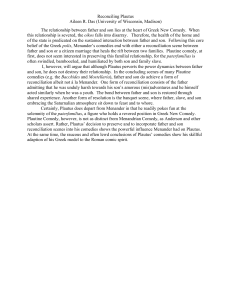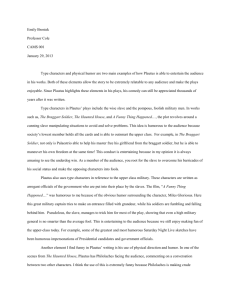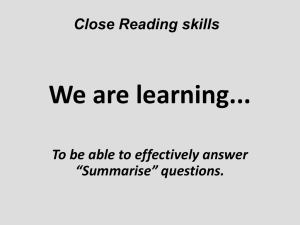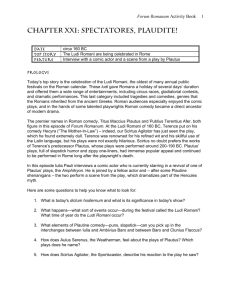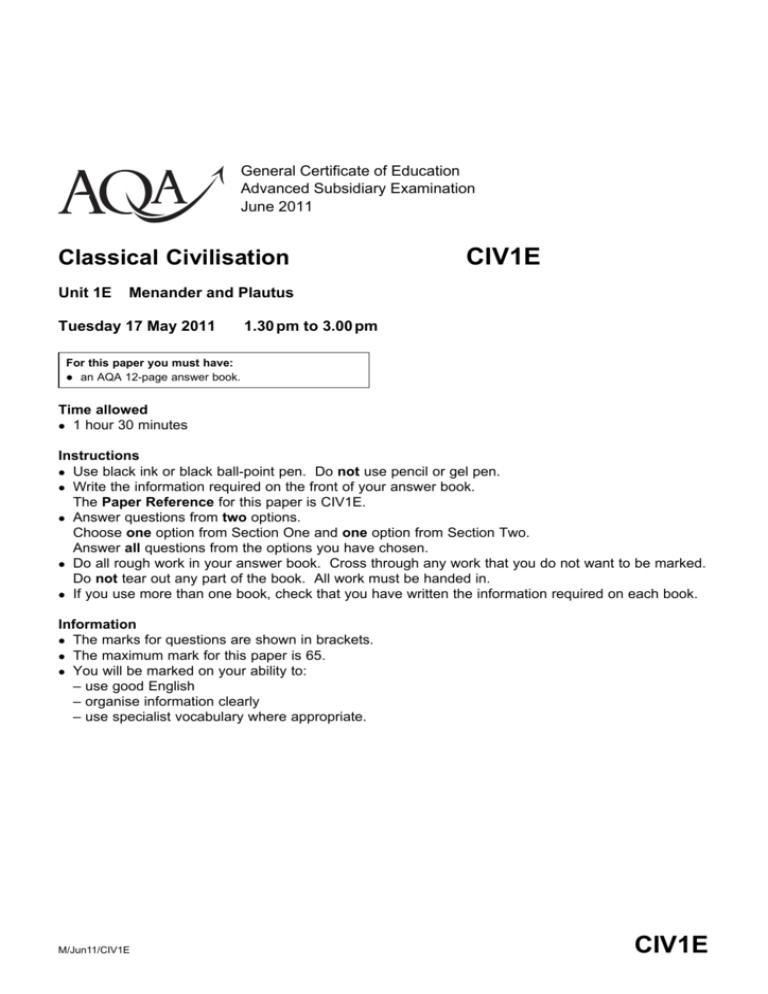
General Certificate of Education
Advanced Subsidiary Examination
June 2011
Classical Civilisation
Unit 1E
CIV1E
Menander and Plautus
Tuesday 17 May 2011
1.30 pm to 3.00 pm
For this paper you must have:
an AQA 12-page answer book.
Time allowed
1 hour 30 minutes
Instructions
Use black ink or black ball-point pen. Do not use pencil or gel pen.
Write the information required on the front of your answer book.
The Paper Reference for this paper is CIV1E.
Answer questions from two options.
Choose one option from Section One and one option from Section Two.
Answer all questions from the options you have chosen.
Do all rough work in your answer book. Cross through any work that you do not want to be marked.
Do not tear out any part of the book. All work must be handed in.
If you use more than one book, check that you have written the information required on each book.
Information
The marks for questions are shown in brackets.
The maximum mark for this paper is 65.
You will be marked on your ability to:
– use good English
– organise information clearly
– use specialist vocabulary where appropriate.
M/Jun11/CIV1E
CIV1E
2
Section One
Choose either Option A or Option B.
Answer all questions from the option you have chosen.
EITHER
Option A
Read the passage below and answer Questions 01 to 05 which follow.
AMPELISCA: Anyone in?… Can I come in?… Anyone there?…
SCEPARNIO: Now then, who’s knocking our door to pieces?
AMPELISCA: Oh, it was me.
SCEPARNIO: Well!! What a bit of luck! A woman, and a pretty one, by God!
AMPELISCA: Good morning, young man.
SCEPARNIO: Good morning to you, young lady.
AMPELISCA: I’ve come –
SCEPARNIO: Come again this evening and you’ll be right welcome. Morning’s not
much good. Eh, what do you say, pretty beauty?
AMPELISCA: Not so free with your hands, if you please.
SCEPARNIO: The very image of Venus, by all the gods. What a twinkle in her eye,
what a shape, what a nice rusty – no, russet – brown skin, what pretty paps,
what luscious lips –
AMPELISCA: Take your hands off me. I’m not public property.
SCEPARNIO: Nothing wrong with a nice little cuddle with a nice little girl, is there?
AMPELISCA: We’ll see about that, when I’ve time to spare for fun and games. Now
will you please tell me whether you can or can not give me what I came for?
SCEPARNIO: What did you come for?
AMPELISCA: If you have eyes you can see what I want.
SCEPARNIO: If you have eyes you can see what I want.
AMPELISCA: The priestess of Venus here sent me to ask you for some water.
SCEPARNIO: Ah well, I’m the priest in charge here. You’ll have to ask me nicely or
you won’t get a drop. Besides, we dug that well at our own expense, and with
our own tools, I may tell you. Go on, say your prayers nicely or you can’t have a
drop of our water.
AMPELISCA: Do you grudge me a little water? Can’t you give me what even
enemies give to enemies?
SCEPARNIO: Can’t you give me what friends give to friends?
AMPELISCA: Oh all right, honey, I’ll do anything you want.
SCEPARNIO: Yippee! I’m in luck. Honey she calls me. You shall have your water,
love. I don’t expect nothing for nothing. Give us your jug.
AMPELISCA: There you are. As quick as you can, please.
SCEPARNIO: Wait here. I’ll be back in a jiffy, honey.
5
10
15
20
25
30
Plautus, The Rope, pages 106-108
M/Jun11/CIV1E
3
0
1
In what circumstances had Ampelisca arrived at the temple of Venus? Make two points.
(2 marks)
0
2
What does the priestess need water for?
0
3
‘Wait here’ (line 33). What does Ampelisca do instead of waiting and why?
0
4
How effective do you find the verbal and visual humour in the passage? Give the
reasons for your views and support them with details from the passage.
(10 marks)
0
5
In The Rope, to what extent does Plautus give the slaves individual personalities and to
what extent are they simply stereotypes? Give the reasons for your views and support
them with details from the play.
(1 mark)
(2 marks)
You might include discussion of
Sceparnio: for example, his dialogue with Plesidippus and Daemones, encounter
with Ampelisca and meeting with Labrax
Trachalio: for example, his conversation with Ampelisca, defence of the girls and
conversations with Plesidippus and Daemones
Gripus: for example, his ambitions, dispute with Trachalio, deal with Labrax and
attitude towards Daemones.
(20 marks)
Turn over for the next question
Turn over
M/Jun11/CIV1E
4
OR
Option B
Read the passage below and answer Questions 06 to 09 which follow.
ALCMENA:
Valour is all,
And he hath all that hath it!
AMPHITRYO: She loves me, by Jupiter. She loves me, bless her; and I love her.
She’ll jump for joy to see me come home – especially after what I’ve achieved.
Nobody thought we could do it, but we did. We beat them hollow – knocked them
out in the first round, thanks to my inspiration and leadership. By Jove, she’ll be
glad to see me.
SOSIA: There’s someone who’ll be glad to see me too, I may say.
ALCMENA: Is that my husband?
AMPHITRYO: Follow me.
ALCMENA: What on earth has he come back for, after saying he couldn’t stay a
minute longer? Could he be trying to catch me out and make sure whether I
really miss him? Well, it’s his house; I suppose he can come back if he wants to.
SOSIA: Sir, I think we had better get back to the ship.
AMPHITRYO: Back to the ship? Why?
SOSIA: I don’t think we’re expected for breakfast here.
AMPHITRYO: What on earth are you talking about?
SOSIA: We’re too late.
AMPHITRYO: Why too late?
SOSIA: The mistress looks as if she’s had it. ...
AMPHITRYO: She’s near her time. Of course I knew she was pregnant when we
went away.
SOSIA: Worse luck for me.
AMPHITRYO: Why for you?
SOSIA: I’m just back in time to bath the baby. It is nine months, I think you said.
AMPHITRYO: Well, don’t be alarmed.
SOSIA: Alarmed? I’m delighted. Let me get my hands on a bucket once more and
I’ll drain the well dry, never trust me again if I don’t.
AMPHITRYO: Don’t worry. We’ll find someone else to do that. Come along. ...
ALCMENA: I ought to go and meet him, I suppose.
AMPHITRYO: With joy Amphitryo greets the wife he has so long desired to see
again, a wife without equal, in his eyes, among all the wives of Thebes, the wife
whom all men of Thebes delight to honour for her virtue. Have you kept well?
Are you glad to see me?
SOSIA: She’d be as glad to see a lost dog, by the look of her.
AMPHITRYO: You seem in splendid shape, my love. I am glad to find you in such
excellent condition.
5
10
15
20
25
30
35
Plautus, Amphitryo, pages 254-256
M/Jun11/CIV1E
5
0
6
‘We beat them hollow’ (line 5). According to Sosia earlier in the play, what act of valour
did Amphitryo perform during the battle and what was his prize?
(2 marks)
0
7
According to Bromia at the end of the play, what happens after Alcmena goes into labour
and gives birth? Give three details.
(3 marks)
0
8
In the passage, how successfully do you think Plautus entertains the audience? Give
the reasons for your views and support them with details from the passage. (10 marks)
0
9
In Amphitryo, to what extent does Plautus poke fun at traditional concepts of men’s and
women’s honour? Give the reasons for your views and support them with details from
the play.
You might include discussion of
Sosia’s account of the war and his meeting with Mercury
the portrayal of Alcmena and her attitude towards Amphitryo’s achievements
Amphitryo’s situation as a result of Jupiter’s trickery
other sources of humour.
(20 marks)
Turn over for the next question
Turn over
M/Jun11/CIV1E
6
Section Two
Choose either Option C or Option D and answer the question below.
EITHER
Option C
1
0
‘Menander mocks human stupidity more harshly than Plautus does.’
To what extent do you agree with this statement? Give the reasons for your views and
support them with details from the plays by Menander and Plautus you have read.
You might include discussion of
Old Cantankerous: Knemon’s behaviour and its consequences; the actions of others
such as Chaereas and Sostratos
The Ghost: the reasons why Tranio tricks Theopropides and what happens as a
result
Amphitryo: the way Jupiter and Mercury play around with the humans
The Rope: the actions of Labrax, Plesidippus and Gripus.
(30 marks)
OR
Option D
1
1
‘The comedies of Menander and Plautus are just harmless fun in which no one gets
seriously hurt physically, emotionally or financially.’
To what extent do you agree with this statement? Give the reasons for your views and
support them with details from the plays by Menander and Plautus you have read.
You might include discussion of
Old Cantankerous: how Knemon treats others and what happens to him
Amphitryo: the effect of Jupiter’s and Mercury’s behaviour on Alcmena, Amphitryo
and Sosia
The Rope: Labrax’s trickery and the consequences for him and the other main
characters
The Ghost: Tranio’s trickery of Theopropides and its consequences.
(30 marks)
END OF QUESTIONS
M/Jun11/CIV1E
7
There are no questions printed on this page
M/Jun11/CIV1E
8
There are no questions printed on this page
ACKNOWLEDGEMENT OF COPYRIGHT-HOLDERS AND PUBLISHERS
Extracts from The Rope and Amphitryo, from The Rope and Other Plays by Plautus, translated by E. F. WATLING (Penguin Classics, 1964).
Copyright © E.F. Watling, 1964. Reproduced by permission of Penguin Books Ltd
Copyright © 2011 AQA and its licensors. All rights reserved.
M/Jun11/CIV1E

